T&T Clark Bibliology Collection (7 vols.)
Digital Logos Edition
Overview
The T&T Clark Bibliology Collection brings together introductions and analyses of arguably the most foundational issue in biblical studies: the nature and origin of Scripture and canon. Several volumes come from the Guides for the Perplexed series which offers clear, concise, and accessible introductions to particularly challenging subjects, like oral tradition and the New Testament, and the origin of the Bible. These volumes concentrate on what makes the subject difficult to grasp and explain key themes and ideas, guiding the reader toward a thorough understanding of the demanding material. Other volumes integrate adjacent academic disciplines to the study of Scripture and canon by marshaling archaeological, socio-cultural, and theological considerations that shed light on this controversial and often-difficult subject.
These valuable volumes are enhanced by the best in Bible software with the Logos editions. Scripture and ancient text citations link directly to English translations and original-language texts, and important terms link to dictionaries, encyclopedias, and a wealth of other resources in your digital library. Perform powerful searches with the Topic Guide where relevant biblical texts and resources are instantly gathered together and enable you to jump into the conversation with the foremost scholars on these issues. Tablet and mobile apps let you take the discussion with you. With Logos Bible Software, the most efficient and comprehensive research tools are in one place so you get the most out of your study.

Key Features
- Accessible guides to the difficult issues of oral tradition and canon formation
- Comprehensive introduction to the concept of Scripture
- Inter-disciplinary analyses of bibliology
Product Details
- Title: T&T Clark Bibliology Collection
- Publisher: T&T Clark
- Volumes: 7
- Pages: 1,584
Individual Titles
- The Origin of the Bible: A Guide for the Perplexed by Lee Martin McDonald
- Scripture: A Guide for the Perplexed by William R. S. Lamb
- Oral Tradition and the New Testament: A Guide for the Perplexed by Rafael Rodriguez
- The Formation and Significance of the Christian Biblical Canon: A Study in Text, Ritual, and Interpretation by Tomas Bokedal
- Pre-Exilic Israel, the Hebrew Bible, and Archaeology: Integrating Text and Artefact by Anthony J. Frendo
- The Bible: Culture, Community, Society edited by Angus Paddison and Neil Messer
- The Domain of the Word: Scripture and Theological Reason by John Webster
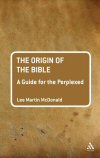
The Origin of the Bible: A Guide for the Perplexed introduces the reader to the often perplexing issue of the Bible’s origin and how the different texts were received. This important topic is dealt with especially in light of the discoveries of significant ancient texts that were not included in the Bible. These previously unknown extra-biblical texts raise questions about the nature and formation of the Bible. Why were some books included and others excluded? Why were some included initially and subsequently rejected? Was there a church cover-up? This volume addresses these and related questions in an accessible and thorough manner.
Lee McDonald is widely perceived to be in the front ranks of specialists on the origin of the Bible and the evolution of the canon. In this book, in a lucid engaging fashion, McDonald guides those who are perplexed about such origins . . . It is superb for classes. I recommend it enthusiastically.
—J. H. Charlesworth, George L. Collord Professor of New Testament Language and Literature, Princeton Theological Seminary
In this Guide for the Perplexed, Lee McDonald has unraveled the intricacies of canon research for the scholar, student, and interested public. Writing in a bracingly accessible style, McDonald clarifies how the Christian Bible of the Old and New Testaments came to be formed and finally fixed. Including numerous extracts from primary sources, McDonald achieves the near impossible in discussing texts ranging from the Hebrew Bible to patristic literature.
—Timothy H. Lim, reader in Hebrew and Old Testament studies, University of Edinburgh
Professor Lee McDonald is an expert in the field of the history of the biblical canon. His contribution to the Guides for the Perplexed series is a helpful summary of what can be gathered from the often scattered remarks in the ancient sources. One of the strengths of the book is that it quotes most of the relevant sources at length . . . His own reconstruction of the origin of the Bible is well argued, clear, and readable. Yet the author honestly warns the reader that there remain open questions, and there are areas in this history where other reconstructions may still be possible.
—Péter Balla, head of the New Testament department, Károli Gáspár University of the Reformed Church in Hungary
Lee M. McDonald is president emeritus and professor emeritus of New Testament studies of Acadia Divinity School in Nova Scotia and adjunct professor of New Testament at Fuller Theological Seminary. He serves as scholar in residence for the American Baptist Churches of Los Angeles and the American Baptist Congregations of the Southwest and Hawaii and is the author of several other books.
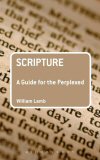
Scripture: A Guide for the Perplexed
- Author: William R. S. Lamb
- Series: Guides for the Perplexed
- Publisher: T&T Clark
- Publication Date: 2013
- Pages: 176
Given the extraordinary richness and range of contemporary theology, questions about the authority and inspiration of the Bible tend to garner ever-increasing variety, complexity, and controversy. Among those challenges include the questions posed by biblical criticism to the enterprise of Christian theology and the place of Scripture in the life of the contemporary church.
Employing a range of conversation partners, this book will provide an up-to-date survey of the diverse ways in which contemporary theologians use the Bible “to think with.” The volume enables students to compare different approaches to the reading of Scripture. It also explores the ways in which the theological interpretation of Scripture can be both a critical and a spiritual exercise.
William R. S. Lamb is vice principal and tutor in New Testament studies at the Westcott House, Cambridge, and an affiliated lecturer on the faculty of divinity at the University of Cambridge.
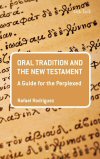
Oral Tradition and the New Testament: A Guide for the Perplexed
- Author: Rafael Rodriguez
- Series: Guides for the Perplexed
- Publisher: T&T Clark
- Publication Date: 2013
- Pages: 128
The last three decades have seen an explosion of biblical scholarship on the presence and consequences of the oral expression of tradition among Jesus’ followers, especially in the earliest decades of the Common Era. However, this scholarship is abstract and technical and, to date, no introductory discussion exists to introduce students to these complex issues being discussed at higher levels of scholarship. Rafael Rodriguez fills that gap in this helpful volume.
Rodriguez adopts a fourfold structure to cover the topic. He begins with the essentials elements of oral-tradition research and defines key terms. Next, he discusses the key players in the field. Then, he examines the methods involved in oral-tradition research among New Testament scholars. Finally, Rodriguez provides examples of the ways in which oral-tradition research can bring texts into clearer focus. The result is a comprehensive introduction to this key area in New Testament studies.
Rafael Rodríguez is associate professor of New Testament at Johnson Bible College in Knoxville, TN. He received his PhD from the University of Sheffield.
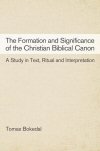
The Formation and Significance of the Christian Biblical Canon: A Study in Text, Ritual, and Interpretation
- Author: Tomas Bokedal
- Publisher: T&T Clark
- Publication Date: 2013
- Pages: 352
This book offers a fresh, cross-disciplinary approach to the current discussion on the Christian canon formation process. By carefully integrating historical, hermeneutical, and theological aspects to account for the emergence of the canon, Bokedal seeks to offer a more comprehensive picture of the canon development than has previously been achieved. The formation and continuous usage of the Christian biblical canon is here viewed as an act of literary preservation and actualization of the church’s apostolic normative tradition. The study focuses on four aspects of canon: the linguistic and effective-historical, the textual and material, the performative, and the ideational. Attention is given to the scribal convention of using nomina sacra, the codex format, oral and written Gospel, early Christian liturgical praxis, and the Rule of Faith.
Bokedal argues that the canon was formed in a process, with its own particular intention, history, and direction. By using a Gadamerian hermeneutics of tradition, the reader’s attention is directed to historical dimensions of the canon and its interpretative possibilities for our time. The notion of effective history (Wirkungsgeschichte), as well as the interaction between text, community, and reader are crucial to the argument. The canonical text as text, its interpretation, and ritual contextualization are highlighted as unifying elements for the communities being addressed.
Tomas Bokedal (ThD, Lund) is lecturer in New Testament at King’s College, University of Aberdeen. His research interests include Christian origins and the relation of Scripture and theology. He has authored several articles and books on the biblical canon.
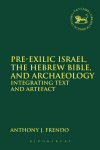
In this volume, Anthony J. Frendo argues that archaeological evidence should be taken into account when approaching the Bible to attain a more reliable reconstruction of the Scripture of ancient Israel. Illustrations are taken from the history of pre-exilic Israel and the importance of studying text with artifact is demonstrated through a detailed case study about the location of the house of Rahab as depicted in Joshua 2:15.
. . . Overall, [the author] has produced an excellent primer for those interested in approaching the study of early Israel. [This book may] provide both an excellent entry point for those seeking to enter the debate as well as fuel for further research.
Anthony J. Frendo is professor of Near Eastern archaeology and the Hebrew Bible, head of the department of oriental studies, a member of the department of classics and archaeology, and co-director of the Confucius Institute at the University of Malta.
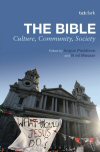
What kind of authority does Scripture have? How is Scripture’s authority to be negotiated in relation to other sources of authority? And what are the implications of confessing the Bible to be authoritative? The Bible: Culture, Community, and Society seeks to answer these questions, covering three core themes. First, contributors discuss reading the Bible in the context of modernity and the challenges that modernity has posed to the Bible’s authority as the Word of God. Second, essays explore the Bible as a text that forms the church community and how the Bible as an authoritative text shapes a culture. Third, contributors address the issue of reading the Bible as a public text and the challenges posed by holding to the Bible as the Word of God in a religiously diverse context. The highly distinguished contributors include Ben Quash, David Ferguson, Angus Paddison, and Zoë Bennett.
Angus Paddison is theology lecturer at the University of Winchester.
Neil Messer is reader in theology and head of the department of theology and religious studies at the University of Winchester. He is the author of Respecting Life: Theology and Bioethics, Selfish Genes and Christian Ethics: Theological and Ethical Reflections on Evolutionary Biology, and Study Guide to Christian Ethics.
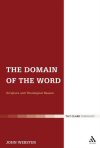
This book brings together a set of related studies on the nature of Scripture and Christian theology by one of the most prominent representatives of Protestant theology of our time. After a brief introduction to the setting of the book and its major themes, the first part of the volume examines topics on the nature and interpretation of Scripture. A comprehensive proposal about Scripture and its interpretation is followed by a study of Scripture as the embassy of the risen Christ and by three related chapters analyzing the ways in which major modern theologians (Barth, T. F. Torrance, and Rowan Williams) have understood the nature and interpretation of the Bible. The second part of the volume makes a cumulative proposal about the nature and tasks of Christian theology, examining the fundamental principles of systematic theology, the distinctive role and scope of reason in Christian theology, the relation of theology to the humanities, and the vocation of theology to promote the peace of the church.
In ten elegantly crafted and precisely written chapters on Scripture and theological reason, John Webster shows himself to be the master of the domain he surveys and serves—and of which he is arguably the prime English-speaking minister. Taken together, these essays represent a bracing manifesto and compelling model of how to do theology with care, competence, and good cheer by situating one’s thought in the broader sphere of the triune God’s loving address. May its domain (of readers) increase!
—Kevin J. Vanhoozer, Blanchard Professor of Theology, Wheaton College and Graduate School
John Webster is a dogmatic theologian in the classic sense: he is seeking God’s face. Knowing in faith that God has lovingly addressed us in the Scriptures, he seeks this loving God therein, trusting in the light that shines from the risen Christ through the work of the Holy Spirit. Disarmingly modest, wonderfully clear, and always attentive to the human weakness and repentance that accompany theological speech, Webster gives us a taste of the joy that is to be had in knowing and loving the triune God through his Scriptures.
—Matthew Levering, professor of theology, University of Dayton
John Webster was Lady Margaret Professor of Divinity at the University of Oxford and is currently professor of systematic theology at the University of Aberdeen. His published work includes a number of books including Barth’s Moral Theology: Human Action in Barth’s Thought and Word and Church: Essays in Christian Dogmatics. He also edited The Oxford Handbook of Systematic Theology, and is an editor of The International Journal of Systematic Theology. He is also a fellow of the Royal Society of Edinburgh.